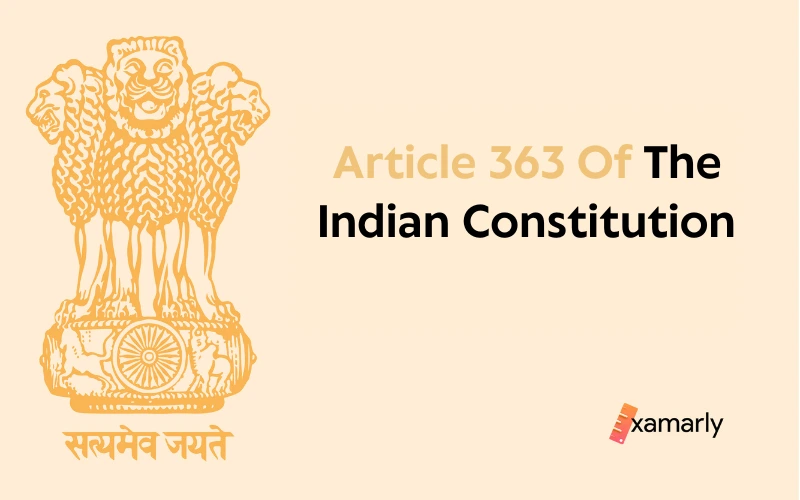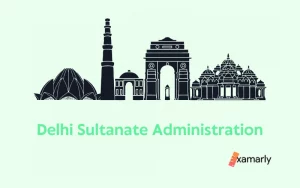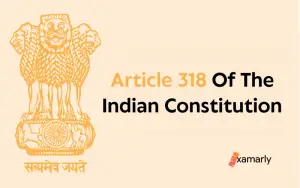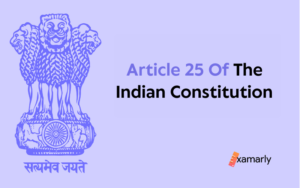The Constitution of India contains several provisions that relate to the relationship between the central government and the states, and to the role of the judicial system in resolving disputes and enforcing the rights and obligations of the parties involved.
Article 363 of the Indian Constitution and Article 363A of the Constitution address two important aspects of this relationship: the bar to interference by courts in disputes arising out of certain treaties, agreements, and other instruments entered into by the government of India before the commencement of the Constitution, and the cessation of the recognition of Indian state rulers and the abolition of privy purses.
In this blog, we will examine the provisions of these Articles and many more related pieces of information.
- Provisions Of Article 363 Of The Indian Constitution
- Case Laws: Cauvery Water Dispute
- All About Article 363A Of The Indian Constitution
- Winding Up
- FAQs On Articles 363 And 363A
- What Is Article 363 Of The Indian Constitution?
- What Is Article 363A Of The Indian Constitution?
- Which Amendment Has Inserted Article 363A?
- In Which Part Of The Indian Constitution Article 363 Mentions?
- What Are Privy Purses?
- Which Amendment In 1971 Abolished The Privy Purses?
- What Is Article 143 Of The Constitution Of India Entails?
Provisions Of Article 363 Of The Indian Constitution
Article 363 of the Indian constitution addresses the prohibition on the involvement of the judicial system in resolving conflicts resulting from certain treaties, agreements, and other legal instruments. Its provisions are as follows:
- Regardless of anything in this Constitution, but subject to the provisions of article 143, neither the Supreme Court nor any other court shall have jurisdiction in any dispute arising out of any provision of a treaty, agreement, covenant, engagement, sanad, or other similar instrument entered into or executed by any Ruler of an Indian State before to the beginning of this Constitution. And to which the Government of the Dominion of India or any of its preceding Governments was a party, and which has or has been in force after such commencement, or in any dispute arising out of any right accruing under or liability or obligation arising out of any of the provisions of this Constitution pertaining to any such treaty, agreement, covenant, engagement, sanad, or other similar instruments.
- In this article—
- (a) “Indian State” means any territory acknowledged prior to the beginning of this Constitution as being such a State by His Majesty or the Government of the Dominion of India, and
- (b) The term “Ruler” encompasses any Prince, Chief, or other person acknowledged as the Ruler of any Indian State by His Majesty or the Government of the Dominion of India prior to such commencement.
Note: Check out the linked article of Article 143 Of The Indian Constitution to comprehend the provisions it outlines.
Case Laws: Cauvery Water Dispute
- Article 363 prohibits the interference by courts in any issues that have arisen as a result of any treaties or agreements that were entered or implemented prior to the beginning of our Constitution by any Ruler of an Indian State and to which the Government was a party.
- The two agreements, one inked in 1892 and the other in 1924, on the allotment of water to Tamil Nadu were executed between the governments of Madras and Mysore.
- Karnataka had contended that in accordance with Article 363, the judiciary lacks the power to get involved in these agreements because they were signed before to the constitution’s start date.
- The Supreme Court did not concur with the state’s line of argument since the agreements in question were not political deals but rather were driven by considerations of public benefit.
All About Article 363A Of The Indian Constitution
Article 363A discusses the cessation of the acknowledgment of Indian State rulers and the abolition of privy purses.
Provisions Of Article 363A
Its provisions are as follows:
In spite of anything else that may be stated in this Constitution or in any other law that is currently in effect:
(a) the Prince, Chief, or other individuals who, at any point prior to the beginning of the Constitution (Twenty-sixth Amendment) Act, 1971, was regarded by the President as the Ruler of an Indian State or any individual who, at any point before such beginning, was designated by the President as the successor of such ruler shall, on and from such commencement, stop to be acknowledged as the ruler or the successor of such Ruler;
(b) Privy purse is abolished and all rights, liabilities, and obligations relating to the privy purse are extinguished as of the start of the Constitution (Twenty-sixth Amendment) Act of 1971. As a result, the Ruler or, as applicable, the successor of such Ruler, referred to in clause (a), or any other individual, shall not be paid any amount as a privy purse.
Why Article 3363A Was Inserted?
In 1971, the Constitution underwent its 26th amendment, which included the addition of Article 363-A. The Privy Purse was abolished as a result of this change.
It was stated that the idea of rulership, with privy purses and special privileges unconnected to any present activities and societal purposes, is inconsistent with a social structure that is egalitarian.
As a result, the government has come to the conclusion that the privy purses and advantages enjoyed by the rulers of the formerly recognized Indian states must end.
In order to accomplish this, it is necessary to amend the relevant Constitutional provisions as well as to add a new article that expressly terminates the recognition that has already been given to such Rulers, abolishes privy purses and eliminates all rights, obligations, and liabilities related to privy purses.
Winding Up
In summary, Articles 363 and 363A of the Constitution of India regulate the involvement of the judicial system in resolving disputes and enforcing the rights and obligations of the parties involved.
Article 363 protects the sovereignty and independence of the states and preserves the continuity of certain treaties and agreements, while Article 363A marks a significant milestone in the integration of the princely states into the Indian Union and the establishment of a democratic and federal system of government.
These articles play a crucial role in defining the constitutional and political landscape of India, and in maintaining the integrity and unity of the Indian Union.
In the interest of further readings:
| Advisory Jurisdiction Of Supreme Court | Article 368 Of The Indian Constitution |
| Article 324 Of The Indian Constitution | Article 356 Of The Indian Constitution |
FAQs On Articles 363 And 363A
What Is Article 363 Of The Indian Constitution?
In the Indian constitution, Article 363 addresses the limitation on the involvement of the court system in resolving problems that are the outcome of certain treaties, accords, and other legal instruments.
What Is Article 363A Of The Indian Constitution?
Article 363A refers to abolishing privy purses and ceasing to acknowledge Indian State rulers.
Which Amendment Has Inserted Article 363A?
26th amendment has inserted Article 363A in the Constitution of India.
In Which Part Of The Indian Constitution Article 363 Mentions?
Part XIX of the Indian Constitution titled “Miscellaneous” enshrines Article 363.
What Are Privy Purses?
Privy purses were payments paid to the ruling families of India’s former princely states in exchange for their consent to unite their kingdoms and give up their right to rule after India’s independence in 1947 and 1949, respectively. After a judicial fight that lasted for two years, the 26th Amendment was passed in 1971, which removed all of the royal families’ privileges and allowances from the central government. Despite this, the privy purses continued to be given to the royal families until that point.
Which Amendment In 1971 Abolished The Privy Purses?
26th constitutional amendment abolished the privy purses. The privy purse finally put an end to all of the privileges and special status enjoyed by previous kings and queens, transforming them into regular citizens with the same rights as other Indians and preventing the formal acknowledgment of their former regal titles, special status, etc.
What Is Article 143 Of The Constitution Of India Entails?
In Article 143 of the Indian Constitution, the authority of the President to seek the advice of the Supreme Court is spelled forth.






